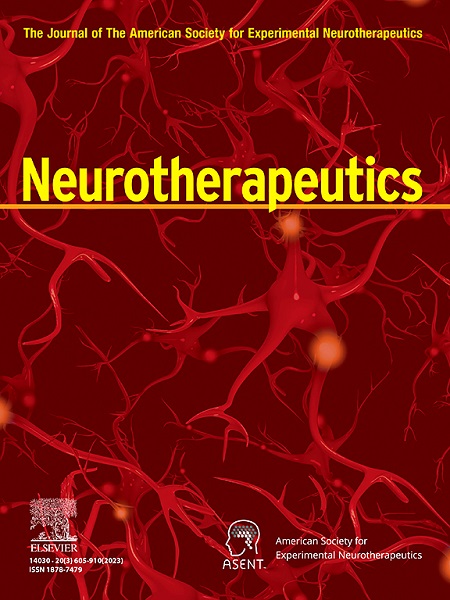在一项随机对照试验中,经颅磁刺激干预在第 2 周的早期疗效可预测精神分裂症患者在第 24 周的后续反应。
IF 5.6
2区 医学
Q1 CLINICAL NEUROLOGY
引用次数: 0
摘要
重复经颅磁刺激(rTMS)是一种非侵入性脑刺激技术,用于调节大脑皮层活动和改善神经可塑性。一些研究对经颅磁刺激的效果等进行了调查,但结果并不一致。本研究旨在探讨经颅磁刺激左侧背外侧前额叶皮层(l-DLPFC)对改善 SZ 认知缺陷是否有效,以及早期疗效能否预测后续随访的疗效。认知能力是在基线、第2周、第6周和第24周使用神经心理状态评估可重复性电池(RBANS)量表进行评估的。我们发现,时间(第0、2、6和24周)与干预对即时记忆和RBANS总分有明显的交互作用(p = 0.02和p = 0.04),这表明10赫兹和20赫兹经颅磁刺激对SZ的即时记忆都有延迟性的有益影响。此外,我们还发现,与假组相比,20 赫兹经颅磁刺激(而非 10 赫兹经颅磁刺激)能改善第 6 周的即时记忆(p = 0.029)。更重要的是,第 2 周即时记忆的改善与第 24 周的改善呈正相关(β = 0.461,t = 3.322,p = 0.002)。我们的研究表明,主动经颅磁刺激疗法有利于改善 SZ 患者的认知缺陷。此外,第2周的疗效可预测24周随访时的疗效。本文章由计算机程序翻译,如有差异,请以英文原文为准。
Early efficacy of rTMS intervention at week 2 predicts subsequent responses at week 24 in schizophrenia in a randomized controlled trial
Repetitive transcranial magnetic stimulation (rTMS) is a non-invasive brain stimulation technique for modulating cortical activities and improving neural plasticity. Several studies investigated the effects of rTMS, etc., but the results are inconsistent. This study was designed to examine whether rTMS applied on the left dorsolateral prefrontal cortex (l-DLPFC) showed an effect on improving cognitive deficits in SZ and whether the early efficacy could predict efficacy at subsequent follow-ups. Cognitive ability was assessed using the Repeatable Battery for the Assessment of Neuropsychological Status (RBANS) scale at baseline, weeks 2, 6, and 24. We found a significant interaction between time (weeks 0, 2, 6, and 24) and intervention on immediate memory and RBANS total scores (p = 0.02 and p = 0.04), indicating that both 10-Hz and 20-Hz rTMS stimulations had a delayed beneficial effect on immediate memory in SZ. Moreover, we found that 20-Hz rTMS stimulation, but not 10-Hz rTMS improved immediate memory at week 6 compared to the sham group (p = 0.029). More importantly, improvements in immediate memory at week 2 were positively correlated with improvements at week 24 (β = 0.461, t = 3.322, p = 0.002). Our study suggests that active rTMS was beneficial for cognitive deficits in patients with SZ. Furthermore, efficacy at week 2 could predict the subsequent efficacy at 24-week follow-up.
求助全文
通过发布文献求助,成功后即可免费获取论文全文。
去求助
来源期刊

Neurotherapeutics
医学-神经科学
CiteScore
11.00
自引率
3.50%
发文量
154
审稿时长
6-12 weeks
期刊介绍:
Neurotherapeutics® is the journal of the American Society for Experimental Neurotherapeutics (ASENT). Each issue provides critical reviews of an important topic relating to the treatment of neurological disorders written by international authorities.
The Journal also publishes original research articles in translational neuroscience including descriptions of cutting edge therapies that cross disciplinary lines and represent important contributions to neurotherapeutics for medical practitioners and other researchers in the field.
Neurotherapeutics ® delivers a multidisciplinary perspective on the frontiers of translational neuroscience, provides perspectives on current research and practice, and covers social and ethical as well as scientific issues.
 求助内容:
求助内容: 应助结果提醒方式:
应助结果提醒方式:


